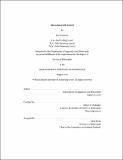| dc.contributor.advisor | Robert C. Stalnaker. | en_US |
| dc.contributor.author | Swanson, Eric (Eric Peter) | en_US |
| dc.contributor.other | Massachusetts Institute of Technology. Dept. of Linguistics and Philosophy. | en_US |
| dc.date.accessioned | 2007-05-16T16:10:59Z | |
| dc.date.available | 2007-05-16T16:10:59Z | |
| dc.date.copyright | 2006 | en_US |
| dc.date.issued | 2006 | en_US |
| dc.identifier.uri | http://hdl.handle.net/1721.1/37356 | |
| dc.description | Thesis (Ph. D.)--Massachusetts Institute of Technology, Dept. of Linguistics and Philosophy, 2006. | en_US |
| dc.description | This electronic version was submitted by the student author. The certified thesis is available in the Institute Archives and Special Collections. | en_US |
| dc.description | Includes bibliographical references (p. [109]-119). | en_US |
| dc.description.abstract | My dissertation asks how we affect conversational context and how it affects us when we participate in any conversation -- including philosophical conversations. Chapter 1 argues that speakers make pragmatic presuppositions when they use proper names. I appeal to these presuppositions in giving a treatment of Frege's puzzle that is consistent with the claim that coreferential proper names have the same semantic value. I outline an explanation of the way presupposition carrying expressions in general behave in belief ascriptions, and suggest that substitutivity failure is a special case of this behavior. Chapter 2 develops a compositional probabilistic semantics for the language of subjective uncertainty, including epistemic adjectives scoped under quantifiers. I argue that we should distinguish sharply between the effects that epistemically hedged statements have on conversational context, and the effects that they have on belief states. I also suggest that epistemically hedged statements are a kind of doxastic advice, and explain how this hypothesis illuminates some otherwise puzzling phenomena. Chapter 3 argues that ordinary causal talk is deeply sensitive to conversational context. The principle that I formulate to characterize that context sensitivity explains at least some of the oddness of 'systematic causal overdetermination,' and explains why some putative overgenerated causes are never felicitously counted, in conversation, as causes. But the principle also makes metaphysical theorizing about causation rather indirectly constrained by ordinary language judgments. | en_US |
| dc.description.statementofresponsibility | by Eric Swanson. | en_US |
| dc.format.extent | 119 p. | en_US |
| dc.language.iso | eng | en_US |
| dc.publisher | Massachusetts Institute of Technology | en_US |
| dc.rights | M.I.T. theses are protected by copyright. They may be viewed from this source for any purpose, but reproduction or distribution in any format is prohibited without written permission. See provided URL for inquiries about permission. | en_US |
| dc.rights.uri | http://dspace.mit.edu/handle/1721.1/7582 | |
| dc.subject | Linguistics and Philosophy. | en_US |
| dc.title | Interactions with context | en_US |
| dc.type | Thesis | en_US |
| dc.description.degree | Ph.D. | en_US |
| dc.contributor.department | Massachusetts Institute of Technology. Department of Linguistics and Philosophy | |
| dc.identifier.oclc | 123190034 | en_US |
